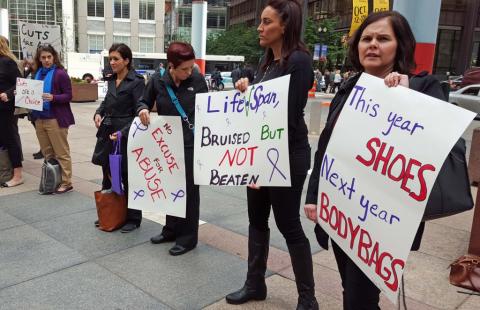AP_408710300312-1024x662.jpg

Yazmin, an immigrant who chose not to give her country of origin or her original name, couldn’t interact with her friends and family after an abusive boyfriend became jealous of her boss and male family members. The boyfriend called her “whore” when she looked at other men.
“For a long time, I felt like he really loved me and he would excuse himself for that negative talk and say that it was because he loved me,” Yazmin said during a conference call hosted by the faith-based advocacy group Sojourners. “Now I know it’s a stupid excuse.”
Yazmin became pregnant. “I stayed with him throughout my pregnancy to give my baby a chance to grow up in a family — one that I didn’t have,” she explained. “I wanted a good future with my baby so I stayed with him.”
When she went to her boyfriend’s house to celebrate a few days before her due date, she found him drunk and “very aggressive.” She left his house, but when they met up again, she said that she was shoved into the back of his car. She had just enough phone battery power to text her friend that her life was in danger. She was too afraid to call the police because she felt that he would see the number on her phone and hurt her. When Yazmin’s boyfriend stopped the car and went to grab something out of the trunk, Yazmin felt for sure that she was going to die.
“I believed it was a gun — I was in so much panic, I was just waiting for him to shoot me in the head,” she said. But after a moment of silence, her boyfriend drove them back home, where he was arrested. Yazmin’s baby was born two days later.
Now, the child is in preschool and Yazmin has been allowed to stay in the country under a U-visa, a special immigration benefit that victims of certain crimes can apply for to legally stay in the country.
Yazmin isn’t alone. There were 26,000 applications filed for U-visas last year — far exceeding the 10,000 annual cap set by the federal government. In fact, U-visa applicants have reached that cap every year for the past six years since the visa was formed.
The Senate’s comprehensive immigration reform bill of 2013 would have raised the cap from 10,000 visas to 18,000. However, the immigration reform bill was never brought to a House floor vote, and Rep. Paul Ryan (R-WI) — the incoming House Speaker — has indicated that he will not move on immigration reform while Obama is still in office.
The government does continue to review pending petitions for eligibility after reaching the cap. Still, the U.S. Citizenship and Immigration Services (USCIS) agency hasn’t evaluated any application submitted after December 2013, according to the Los Angeles Times.
This issue is especially relevant for the immigrant community. Immigrant women, particularly undocumented ones, face an especially difficult time escaping domestic abuse. For instance, undocumented immigrants in Indiana cannot use public assistance and are unable to legally work, so it’s difficult to leave an abusive partner if they rely on that financial support to feed their children. As a legal counsel with the Indiana Coalition Against Domestic Violence told Public News Service, a victim in that situation “is leaving security for complete insecurity.”
The Violence Against Women Act reauthorization of 2013 helped improve response time of law enforcement officials, but there are still hurdles to overcome when immigrant women apply for the U-visa. Local law enforcement officials have to sign off on paperwork that documents the crime and the role that victims played in assisting them in the investigation.
But officials can still stand in the way of assault or violence survivors who try to report the crimes, thereby hindering their ability to apply for visas to stay in the country. For instance, after Nubia Rodriguez was assaulted and kidnapped by an ex-boyfriend, law enforcement officials never returned her call to sign the paperwork that she needed to apply for a U-visa, according to the Associated Press. And in May, a North Carolina county prosecutor refused to certify U-visas for Latino women because he told the Charlotte Observer that “it was never intended to protect Latinos from Latinos.”
At least one state is making sure that immigrant women have a voice when they suffer abuse. California Gov. Jerry Brown (D) recently signed legislation that requires local police and prosecutors to sign the paperwork, making the state the first in the nation to require law enforcement agencies to comply.
Today, Yazmin says that she doesn’t consider herself a victim of domestic violence. “I consider myself a survivor,” she said.